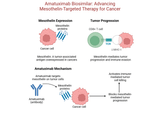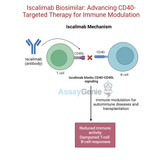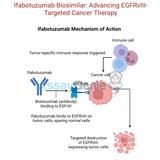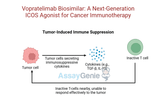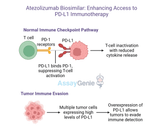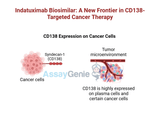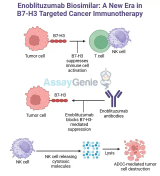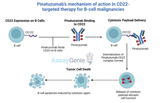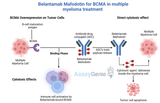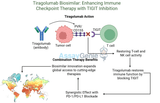Blog
Siltuximab: Exploring IL-6 Inhibition in Castleman’s Disease and Research
Quick Facts About SiltuximabWhat is Siltuximab?Siltuximab is a monoclonal antibody targeting interleukin-6 (IL-6), a cytokine involved in inflammation and immune regulation.What is the mechanism of action for Siltuximab?Siltuximab binds to IL-6, preventing it from interacting with its receptor and mitigating downstream pro-inflammatory signaling.What are the clinical applications of Siltuximab?Siltuximab is approved for treating multicentric Castleman’s disease (MCD) in patients negative for HIV and HHV-8.1.) Understanding SiltuximabWhat Makes Siltuximab Unique?Siltuximab is a chimeric monoclonal antibody specifically designed to neutralize interleukin-6 (IL-6), a pro-inflammat
…
16th Jan 2025
Sacituzumab: Exploring its Role in Cancer Research and the Rise of Biosimilars
Key Facts About SacituzumabWhat is Sacituzumab?Sacituzumab is an antibody-drug conjugate (ADC) that targets the tumor-associated antigen Trop-2, used to treat various cancers, including breast and bladder cancers.What is the mechanism of action for Sacituzumab?Sacituzumab delivers a cytotoxic agent directly to tumor cells via its Trop-2 targeting, providing targeted therapy that reduces systemic toxicity.What are the clinical applications of Sacituzumab?Sacituzumab is used in treating advanced triple-negative breast cancer (TNBC) and urothelial carcinoma. Ongoing studies are exploring its efficacy in other cancers, including brain metastasis.Is Sacituzumab safe?While generally
…
16th Jan 2025
Ipilimumab and Nivolumab: Advancing Research on CTLA-4 in Cancer Therapy
What You Need to Know About IpilimumabWhat is Ipilimumab?Ipilimumab is a monoclonal antibody that targets CTLA-4, a protein involved in downregulating the immune system, to boost the body's immune response against cancer cells.How does Ipilimumab work?By inhibiting CTLA-4, ipilimumab enhances T-cell activation and proliferation, enabling a stronger immune response to attack tumors.What are the side effects of Ipilimumab?Common side effects include fatigue, diarrhea, rash, and more severe immune-related adverse events like colitis and hepatitis.What is the role of Ipilimumab in combination with Nivolumab?The combination of ipilimumab and nivolumab has shown enhanced efficacy in
…
16th Jan 2025
Amatuximab: Exploring Mesothelin-Targeted Therapy for Cancer Research
What You Need to Know About AmatuximabIs Amatuximab safe?Amatuximab has shown a manageable safety profile in clinical trials, with most side effects being mild to moderate. Severe adverse reactions have been rare but should be closely monitored in clinical settings.What is Amatuximab used for?Amatuximab targets mesothelin, a protein overexpressed in certain cancers, including mesothelioma and ovarian cancer. It is used in research to study its therapeutic potential in treating these malignancies.What role does Amatuximab play in mesothelioma treatment?Amatuximab has been evaluated in mesothelioma due to its ability to bind to mesothelin, potentially disrupting tumor growth and
…
15th Jan 2025
Iscalimab: Advancing Research in Autoimmune Diseases and Transplantation
What You Need to Know About IscalimabWhat is Iscalimab?Iscalimab (CFZ533) is a monoclonal antibody targeting CD40, a key protein involved in immune system regulation.What is the mechanism of action for Iscalimab?Iscalimab blocks the CD40-CD40L pathway, preventing the activation of T cells and B cells, which are central to autoimmune responses and transplant rejection.What are the clinical applications of Iscalimab?Iscalimab is under investigation for treating autoimmune diseases like Sjögren's syndrome, lupus nephritis, and for improving outcomes in organ transplantation.1.) Understanding IscalimabIscalimab (CFZ533) is an innovative monoclonal antibody developed by Novartis to
…
15th Jan 2025
Ifabotuzumab: Exploring the Role of Anti-EphA3 in Cancer Research
What You Need to Know About IfabotuzumabWhat is Ifabotuzumab?Ifabotuzumab is a monoclonal antibody targeting EphA3, a receptor tyrosine kinase overexpressed in certain cancers. It plays a critical role in tumor angiogenesis and microenvironment regulation.What is the mechanism of action for Ifabotuzumab?Ifabotuzumab binds to EphA3, disrupting tumor-supportive interactions and potentially reducing tumor growth and spread.What are the clinical applications of Ifabotuzumab?This antibody is being studied for its therapeutic potential in treating various cancers, including glioblastoma and solid tumors.1.) Understanding IfabotuzumabIfabotuzumab is a humanized monoclonal antibody des
…
15th Jan 2025
Vopratelimab: Unlocking the Potential of ICOS in Cancer Research
What You Need to Know About VopratelimabWhat is Vopratelimab?Vopratelimab is an experimental monoclonal antibody that targets the Inducible T-cell CO-Stimulator (ICOS) protein, playing a pivotal role in enhancing immune system activity against cancer.What is the mechanism of action for Vopratelimab?Vopratelimab activates ICOS on T-cells, boosting their proliferation and effector functions, which are crucial for mounting an effective anti-tumor immune response.What are the clinical applications of Vopratelimab?Emerging studies suggest that Vopratelimab holds promise in cancer immunotherapy, particularly for solid tumors like non-small cell lung cancer (NSCLC) and head and neck s
…
15th Jan 2025
Brentuximab: Unveiling the Role of Anti-CD30 in Cancer Research
Key Facts About BrentuximabWhat is Brentuximab?Brentuximab is a monoclonal antibody targeting CD30, commonly used in the treatment of Hodgkin lymphoma and systemic anaplastic large cell lymphoma.What is the mechanism of action for Brentuximab?Brentuximab vedotin works by delivering a cytotoxic agent to CD30-positive cells, inducing cell death through a targeted mechanism.What are the clinical applications of Brentuximab?Brentuximab is primarily utilized in managing Hodgkin lymphoma, systemic ALCL, and other CD30-positive malignancies. It has also been studied in combination therapies for enhanced efficacy.1.) Understanding BrentuximabBrentuximab vedotin is a revolutionary antib
…
15th Jan 2025
Gemtuzumab: Advancing CD33-Targeted Therapies in AML Research
Key Facts About GemtuzumabWhat is Gemtuzumab?Gemtuzumab is an antibody-drug conjugate (ADC) targeting CD33, a protein expressed on the surface of myeloid cells. It is widely recognized for its role in treating acute myeloid leukemia (AML).How does Gemtuzumab work?Gemtuzumab binds to CD33-positive cells and delivers a cytotoxic agent, ozogamicin, to induce cell death specifically in AML cells, sparing healthy tissue.What is the approval history of Gemtuzumab Ozogamicin?Initially approved by the FDA in 2000, Gemtuzumab ozogamicin (Mylotarg) faced a withdrawal in 2010. However, it was reapproved in 2017 after new data affirmed its efficacy and safety.1.) Understanding GemtuzumabGe
…
15th Jan 2025
Atezolizumab: Unveiling the Role of Anti-PD-L1 in Cancer Research
Quick Facts About AtezolizumabWhat is Atezolizumab?Atezolizumab is an anti-PD-L1 monoclonal antibody used in immunotherapy to treat various cancers by enhancing the immune system's ability to attack tumors.What is the mechanism of action for Atezolizumab?Atezolizumab blocks the interaction between PD-L1 and PD-1, restoring T-cell activity and promoting anti-tumor immunity.What are the clinical applications of Atezolizumab?It is approved for cancers such as non-small cell lung cancer (NSCLC), triple-negative breast cancer (TNBC), and urothelial carcinoma, among others.1.) Understanding AtezolizumabAtezolizumab, marketed as Tecentriq, is a pioneering PD-L1 checkpoint inhibitor de
…
15th Jan 2025
Cobolimab: Unveiling TIM-3’s Role in Cancer Immunotherapy
Quick Facts About CobolimabWhat is Cobolimab?Cobolimab is a monoclonal antibody that targets TIM-3, a checkpoint protein involved in immune regulation, especially in cancer and autoimmune diseases.How does Cobolimab work?By inhibiting TIM-3, Cobolimab reactivates T-cells, boosting the immune system’s ability to identify and destroy cancer cells.What is Cobolimab’s significance in GSK’s research?As part of GSK’s immuno-oncology pipeline, Cobolimab is being investigated for its potential in combination therapies to improve cancer treatment outcomes.1.) Understanding CobolimabCobolimab is a novel monoclonal antibody developed to enhance cancer immunotherapy by targeting T-cell imm
…
15th Jan 2025
Indatuximab: Advancing CD138-Targeted Therapy in Cancer Research
What You Need to Know About IndatuximabWhat is Indatuximab?Indatuximab ravtansine is an experimental monoclonal antibody-drug conjugate (ADC) that targets CD138, a protein highly expressed on the surface of certain cancer cells, including multiple myeloma and some solid tumors.What is the mechanism of action for Indatuximab?Indatuximab ravtansine delivers a cytotoxic agent directly to cancer cells by binding to CD138, ensuring selective killing of malignant cells while sparing healthy tissues.What are the clinical applications of Indatuximab?Indatuximab ravtansine is being explored in clinical trials for its potential to treat relapsed and refractory multiple myeloma as well as
…
14th Jan 2025
Enoblituzumab: Unveiling the Role of Anti-B7-H3 in Cancer Research
Key Facts About EnoblituzumabWhat is Enoblituzumab?Enoblituzumab is a monoclonal antibody targeting the B7-H3 protein, which is expressed on the surface of various cancer cells, including those in prostate cancer, sarcoma, and ovarian cancer.What is the mechanism of action for Enoblituzumab?Enoblituzumab works by binding to the B7-H3 protein on tumor cells, blocking its immune evasion mechanisms and enhancing immune system recognition and destruction of the cancer cells.What are the clinical applications of Enoblituzumab?Enoblituzumab is primarily being studied in clinical trials for its potential to treat cancers such as prostate cancer, sarcoma, and ovarian cancer. Emerging s
…
14th Jan 2025
What is the difference between PBS and dPBS?
In the realm of biological and biochemical research, solutions play a pivotal role in various experimental procedures, from cell culture to molecular biology assays. Among the plethora of solutions utilized, phosphate-buffered saline (PBS) and Dulbecco’s phosphate-buffered saline (DPBS) stand out as crucial components. While both solutions share similarities, they possess distinct compositions and applications that merit exploration and understanding.Phosphate-Buffered Saline (PBS): A Versatile SolutionPBS, a staple in laboratories worldwide, serves as a fundamental isotonic buffer solution utilized across diverse applications. Its composition typically consists of sodium chlor
…
31st Dec 2024
Targeting IL-10R: Enhancing Immune Activation in Cancer
Introduction to IL-10R and Immune Suppression in CancerThe interleukin-10 receptor (IL-10R) is a key player in regulating immune responses, particularly in suppressing inflammation and maintaining immune tolerance. IL-10R is activated by its ligand, interleukin-10 (IL-10), an anti-inflammatory cytokine that is critical in controlling excessive immune activation and preventing tissue damage during infection or inflammation. However, in the context of cancer, IL-10 signaling can be exploited by tumor cells to suppress immune responses, particularly by inhibiting the activity of T cells and dendritic cells, creating a microenvironment conducive to tumor growth.Targeting IL-10R with
…
12th Dec 2024
Pinatuzumab: Advancing Cancer Research and Therapeutics
Quick Facts About PinatuzumabWhat is Pinatuzumab?Pinatuzumab is an antibody-drug conjugate (ADC) designed to target CD22, a protein highly expressed on B-cell malignancies, including non-Hodgkin lymphoma (NHL).What is the mechanism of action for Pinatuzumab?It delivers cytotoxic agents directly to cancer cells by binding to CD22, resulting in targeted cell death while sparing healthy tissues.What are the clinical applications of Pinatuzumab?Pinatuzumab has been explored in clinical trials for treating B-cell lymphomas and other hematologic malignancies.Is Pinatuzumab still in use?While specific trials have concluded, Pinatuzumab’s foundational research continues to inform ADC d
…
12th Dec 2024
Belantamab: A Game-Changer in Multiple Myeloma Therapy
Quick Facts About BelantamabWhat is Belantamab?Belantamab Mafodotin is a cutting-edge antibody-drug conjugate (ADC) designed for the treatment of relapsed or refractory multiple myeloma.How does Belantamab work?It targets B-cell maturation antigen (BCMA) on multiple myeloma cells, delivering a potent cytotoxic agent to destroy cancerous cells effectively.What are the side effects of Belantamab?Keratopathy (eye toxicity) is the most notable adverse effect, requiring regular ophthalmic monitoring during treatment.Is Belantamab approved?Yes, Belantamab Mafodotin received accelerated approval from the FDA for patients with limited treatment options for multiple myeloma.1.) Understa
…
12th Dec 2024
Vibostolimab: Mechanism, Clinical Applications, and Research Potential in Oncology
Key Facts About VibostolimabWhat is Vibostolimab?Vibostolimab is an anti-TIGIT monoclonal antibody developed by Merck, targeting immune checkpoint pathways to enhance anti-tumor immunity.What is the mechanism of action for Vibostolimab?Vibostolimab inhibits TIGIT, a receptor that suppresses T-cell activity, promoting a robust immune response against cancer cells.What are the clinical applications of Vibostolimab?It is investigated for various cancers, including melanoma and non-small cell lung cancer (NSCLC), often in combination with pembrolizumab.Is Vibostolimab safe?Studies have demonstrated a manageable safety profile, with side effects similar to other immune checkpoint in
…
12th Dec 2024
Tiragolumab: Unlocking New Horizons in Cancer Immunotherapy
Quick Facts About TiragolumabWhat is Tiragolumab?Tiragolumab is an anti-TIGIT monoclonal antibody developed to enhance immune responses against cancer cells. It is currently under investigation for its potential in treating various cancersWhat is the mechanism of action for Tiragolumab?Tiragolumab blocks TIGIT, a receptor on immune cells that inhibits anti-tumor activity, restoring the immune system's ability to attack cancer cells.What cancers does Tiragolumab target? Tiragolumab is being studied in non-small cell lung cancer (NSCLC), small cell lung cancer (SCLC), and other solid tumors, often in combination with atezolizumab.What cancers does Tiragolumab target? Pr
…
12th Dec 2024
Rituximab: Mechanism, Applications, and Research Potential
Quick Facts About RituximabWhat is Rituximab?Rituximab is a monoclonal antibody targeting CD20, a protein found on the surface of B cells. It plays a crucial role in treating autoimmune diseases and certain cancers, such as non-Hodgkin's lymphoma.What is the mechanism of action for Rituximab?Rituximab works by binding to CD20, leading to B cell destruction through immune-mediated processes such as complement activation and apoptosis.What are the clinical applications of Rituximab?Rituximab is used to treat conditions like rheumatoid arthritis, chronic lymphocytic leukemia, and non-Hodgkin’s lymphoma. It’s also being explored for multiple sclerosis (MS) and lupus.What are the cl
…
12th Dec 2024
Girentuximab: Exploring Its Mechanism, Clinical Potential, and Research Advancements
Quick Facts About GirentuximabWhat is Girentuximab?Girentuximab is a monoclonal antibody targeting carbonic anhydrase IX (CAIX), predominantly expressed in renal cell carcinoma (RCC) cells. It is designed to enhance tumor-specific immune responses.What is the mechanism of action for Girentuximab?Girentuximab binds to CAIX on RCC cells, promoting antibody-dependent cellular cytotoxicity (ADCC) and complement-dependent cytotoxicity (CDC), crucial for its therapeutic efficacy.What are the clinical applications of Girentuximab?It has shown promise in treating advanced RCC and is being explored in combination with radioisotopes for precision oncology.1.) Understanding GirentuximabGi
…
10th Dec 2024
Tesnatilimab: Unveiling the Potential of Anti-CD47 in Cancer Research
Quick Facts About TesnatilimabWhat is Tesnatilimab?Tesnatilimab is an anti-CD47 monoclonal antibody designed to block the "don’t eat me" signal used by cancer cells to evade immune responses.What is the mechanism of action for Tesnatilimab?Tesnatilimab binds to the CD47 receptor on cancer cells, enhancing their phagocytosis by macrophages and other immune cells.What are the clinical applications of Tesnatilimab?It is being explored for its efficacy in treating various cancers, including hematologic malignancies and solid tumors.Is Tesnatilimab safe?Studies highlight its potential with a manageable safety profile, though some patients may experience mild-to-moderate immune-relat
…
10th Dec 2024
Etigilimab: Unveiling the Role of Anti-TIGIT in Cancer Research
Key Facts About EtigilimabWhat is Etigilimab?Etigilimab is an anti-TIGIT monoclonal antibody being studied for its potential role in cancer immunotherapy.What role does Etigilimab play in targeting TIGIT?Etigilimab inhibits TIGIT, a receptor that suppresses T-cell activity, enhancing the immune system's ability to combat tumors.What are the clinical applications of Etigilimab?Etigilimab is being explored in combination therapies for treating various cancers, leveraging its immune-boosting capabilities.1.) Understanding EtigilimabEtigilimab, also known by its research name MGA271, is a monoclonal antibody that targets TIGIT (T-cell immunoreceptor with Ig and ITIM domains). TIGIT
…
10th Dec 2024
Varlilumab: Unlocking CD27’s Potential in Cancer Research
What You Need to Know About VarlilumabWhat is Varlilumab?Varlilumab is a monoclonal antibody targeting CD27, a receptor on T-cells that plays a critical role in immune modulation.What is the mechanism of action for Varlilumab?Varlilumab enhances immune responses by activating CD27 signaling, promoting T-cell proliferation, and regulating immune suppression in cancer.What are the clinical applications of Varlilumab?Varlilumab has been studied in combination therapies, particularly with immune checkpoint inhibitors like nivolumab, for cancers such as melanoma and glioblastoma.1.) Understanding VarlilumabVarlilumab (CDX-1127) is a human monoclonal antibody developed by Celldex The
…
5th Dec 2024




